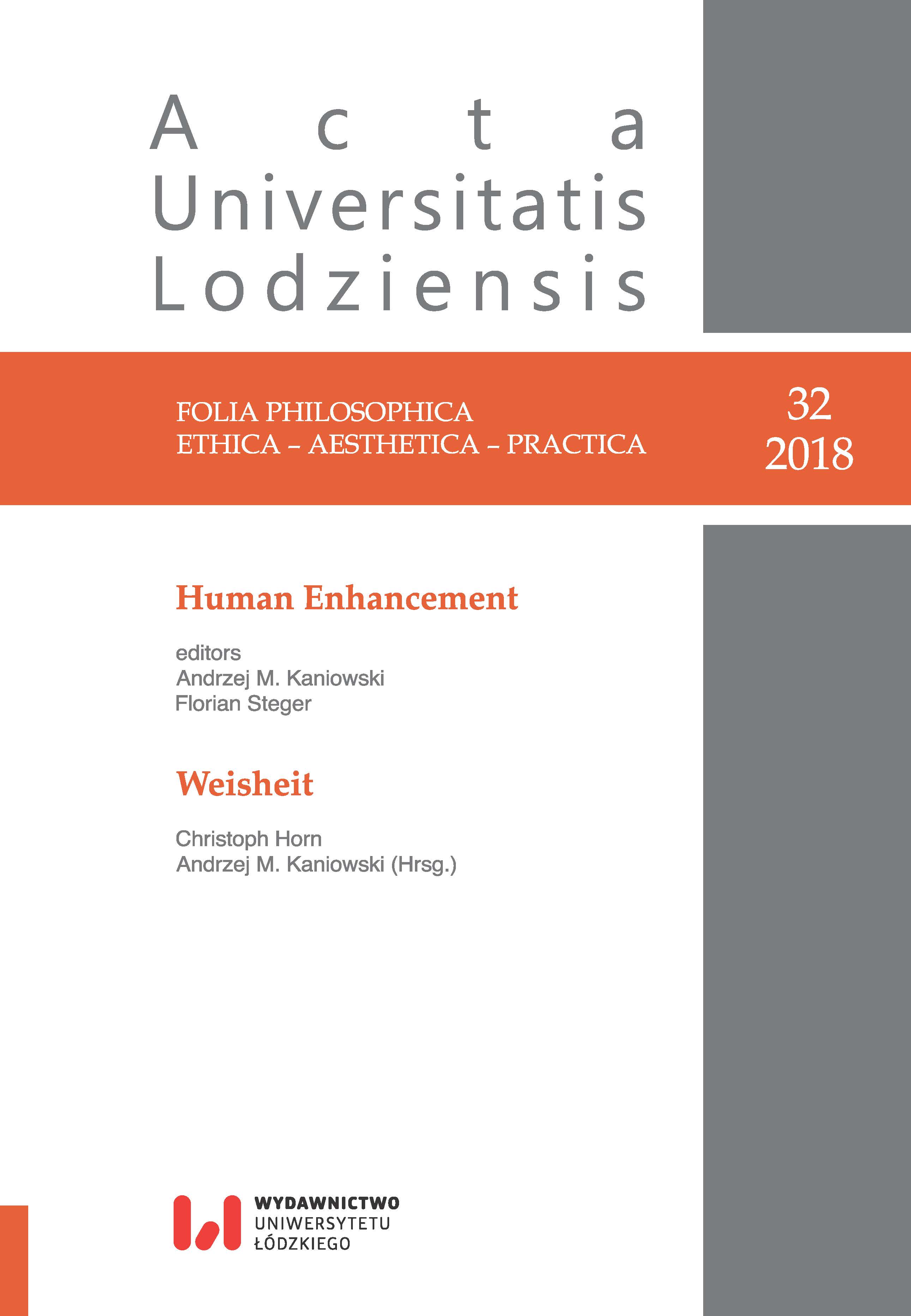Artistic Enhancement. Literature and Film as Mirror and Means of Human Enhancement
DOI:
https://doi.org/10.18778/0208-6107.32.05Keywords:
Human enhancement, artistic representations of genetic enhancement, medical ethics, public debate, enhancement through artAbstract
Human enhancement affects all members of society and is thus closely linked to issues of social justice: up to now, the promises and perils of enhancement are usually only known to, and thus used, by few members of society. This can lead to individual competitive advantages that create or widen social gaps. Broad public information is, therefore, key to ensure that enhancement does not conflict with the principle of equality of opportunities. As possible means of public information, literature and films are able to counter such possible social injustice, which is why they may be allotted a central role in the ethical debates on human enhancement. Two aspects will be considered in this regard: 1) enhancement in art and 2) through art. 1) The extent to which artistic depictions and public information and perceptions of enhancement may be intertwined will be illustrated by two examples where both texts and their accompanying paratexts had a particular bearing on the public debate on enhancement: the film Gattaca of 1997 and the novel Never let me go (2005) by Nobel laureate Kazuo Ishiguro. 2) The second part of the paper is dedicated to the question of how far enhancing selected groups of society may contribute to a greater common good and which potentials art can offer in this regard. Three groups of persons will be taken into account: 1) clinical ethics committees, 2) physicians, and 3) patients.
References
[Gattaca “Children made to order”]. Squarespace, [no date]. Accessed June 28, 2018. https://static1.squarespace.com/static/51b3dc8ee4b051b96ceb10de/t/5735e441c2ea51de4c28f9f5/1463149645926/gattaca-ad-made-to-order
Google Scholar
“Bioethics at the Box Office: Human Enhancement Edition.” Center for Bioethics and Human Dignity, August 25, 2016. Accessed June 27, 2018. https://cbhd.org/content/bioethics-boxoffice-human-enhancement-edition
Google Scholar
“Biofiction: Human Enhancement Edition.” Center for Bioethics and Human Dignity, August 23, 2016. Accessed June 27, 2018. https://cbhd.org/content/biofiction-human-enhancementedition
Google Scholar
Badley, Graham Francis. “‘Manifold Creatures’. A Response to the Posthumanist Challenge.” Qualitative Inquiry 24 (2018): 421–432.
Google Scholar
Ball, Philip. “Designer babies: an ethical horror waiting to happen?.” The Guardian, January 8, 2017. Accessed June 28, 2018. https://www.theguardian.com/science/2017/jan/08/designer-babies-ethical-horror-waiting-to-happen
Google Scholar
Beauchamp, Tom, and James Childress. Principles of Biomedical Ethics. Oxford, New York: Oxford University Press, 2013.
Google Scholar
Brown, Kristine. “Personhood: Fukuyama’s Caveats and Ishiguro’s Never Let Me Go.” Sanglap: Journal of Literary and Cultural Inquiry 2 (2015): 128–139.
Google Scholar
Cormick, Craig. “Cloning goes to the movies.” História, Ciências, Saúde – Manguinhos 13 (2006): 181–212.
Google Scholar
Czichos, Joachim. “Hirndoping erlaubt. Nobelpreise mit Neuro-Enhancement.” Wissenschaft aktuell, [no date]. Accessed June 28, 2018. https://www.wissenschaft-aktuell.de/extra_rubriken/Hirndoping_erlaubt.html
Google Scholar
Fischer, Pascal. “Literatur als Mittel zur Förderung der Empathie in den Heilberufen.” In Literatur und Medizin – interdisziplinäre Beiträge zu den Medical Humanities, edited by Pascal Fischer and Mariacarla Gadebusch Bondio, 53–77. Heidelberg: Winter, 2016.
Google Scholar
Fürholzer, Katharina, and Sabine Salloch. “Reading literary fiction as moral enhancement.” American Journal of Bioethics. Neuroscience 7 (2016): 104–106.
Google Scholar
Genette, Gérard. Paratexts. Thresholds of interpretation. Cambridge: Cambridge University Press, 1997.
Google Scholar
Hamilton, Sheryl N. “Traces of Future: Biotechnology, Science Fiction and Media.” Science Fiction Studies 30 (2003): 267–282.
Google Scholar
Harris, John, and David R. Lawrence. “Hot baths and cold minds. Neuroscience, mind reading, and mind misreading.” Cambridge Quarterly of Healthcare Ethics 24 (2015): 123–134.
Google Scholar
Heil, Reinhard. “Human Enhancement – Eine Motivsuche bei J. D. Bernal, J. B. S. Haldane und J. S. Huxley.” In Historische, philosophische und ethische Aspekte der technologischen Verbesserung des Menschen, edited by Andreas Woyke, Reinhard Heil, Stefan Gammel, and Christopher Coenen, 41–62. Bielefeld: Transcript Verlag, 2010.
Google Scholar
Ishiguro, Kazuo. “Nobel Lecture (December 7, 2017).” The Nobelprize. Accessed September 4, 2018. https://www.nobelprize.org/prizes/literature/2017/ishiguro/25124-kazuo-ishiguro-nobel-lecture-2017
Google Scholar
Ishiguro, Kazuo. Never let me go. New York: Knopf, 2005.
Google Scholar
Jałocha, Aneta. “Genetics in Cinema. The Dialectics of Past, Present and Future.” Kultura Popularna 4 (2013): 82–93.
Google Scholar
Jaspers, Karl. Die Idee des Arztes. Bern: Huber, 1953.
Google Scholar
Kidd, David, and Emanuele Castano. “Reading literary fiction improves theory of mind.” Science 342 (2013): 377–380.
Google Scholar
Kirby, David A. “The New Eugenics in Cinema: Genetic Determinism and Gene Therapy in ‘GATTACA’.” Science Fiction Studies 27 (2000): 193–215.
Google Scholar
Kracauer, Siegfried. Von Caligari bis Hitler. Ein Beitrag zur Geschichte des deutschen Films. Hamburg: Rowohlt, 1958.
Google Scholar
Neumann, Melanie, Friedrich Edelhäuser, Diethard Tauschel, Martin R. Fischer, Markus Wirtz, Christiane Woopen, Aviad Haramati, and Christian Scheffer. “Empathy decline and its reasons: A systematic review of studies with medical students and residents.” Academic Medicine 86 (2011): 996–1009.
Google Scholar
Niccol, Andrew M. “Untitled [Gattaca script].” The Internet Movie Script Database (IMSDb). Accessed June 28, 2018. http://www.imsdb.com/scripts/Gattaca.html
Google Scholar
Niccol, Andrew M. 1997. Gattaca. USA: Columbia Pictures.
Google Scholar
Parens, Erik. “Is Better Always Good? The Enhancement Project.” In Enhancing Human Traits. Ethical and Social Implications, edited by Erik Parens, 1–28. Washington: Georgetown University Press, 1998.
Google Scholar
Reiter-Theil, Stella. “Balancing the perspectives. The patient’s role in clinical ethics consultation.” Medicine, Health Care and Philosophy 6 (2006): 247–254.
Google Scholar
Romanek, Mark, director. 2010. Never let me go. United Kingdom: DNA Films, Channel Four Films.
Google Scholar
Samuels, Andrew. The Political Psyche. London: Routledge, 1993.
Google Scholar
Schöne-Seifert, Bettina, and Barbara Stroop. “Enhancement.” Working Papers of the Centre for Advanced Studies in Bioethics 71 (2015): 1–8.
Google Scholar
Silver, Lee M. “Genetics goes to Hollywood.” Nature Genetics 17 (1997): 260–261.
Google Scholar
Weizsäcker, Viktor von. “Der Arzt und der Kranke [1926].” In Viktor von Weizsäcker, Gesammelte Schriften, vol. 5, edited by Peter Achilles, 9–26. Frankfurt am Main: Suhrkamp, 1987.
Google Scholar
Weizsäcker, Viktor von. “Der Gestaltkreis [1940].” In Viktor von Weizsäcker, Gesammelte Schriften, vol. 4, edited by Dieter Janz, 23–61. Frankfurt am Main: Suhrkamp, 1997.
Google Scholar
Downloads
Published
How to Cite
Issue
Section
License

This work is licensed under a Creative Commons Attribution-NonCommercial-NoDerivatives 4.0 International License.












